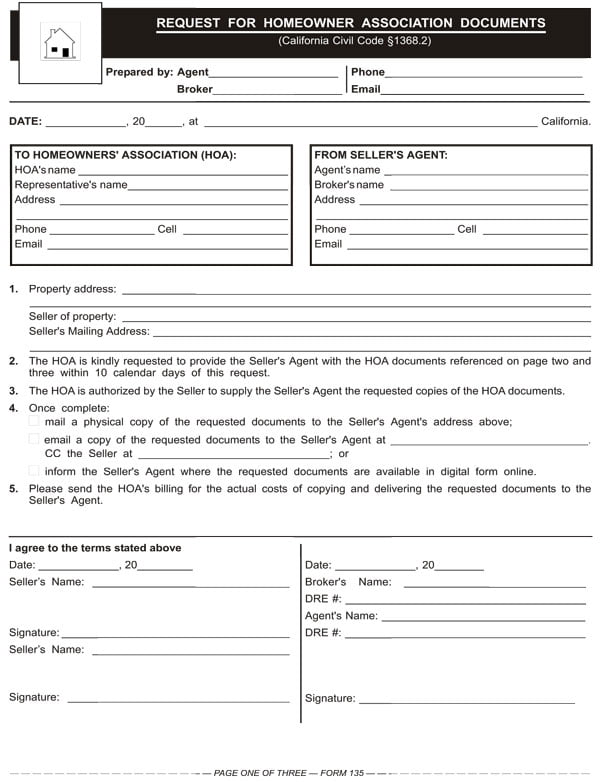Request for HOA documentation
This article comments on the seller’s agent’s use of homeowners’ association (HOA) documents to market a property listed for sale in a common interest development (CID), and fully inform prospective buyers about the conditions of the HOA and the project that concern every buyer.
Implicit bargain
A buyer seeking to acquire a unit in a residential common interest development (CID) is bargaining for living restrictions and ownership operating costs unlike those experienced in the ownership of a self-managed, detached single family residence (SFR).
Ownership of a unit in a CID includes compulsory membership in the homeowners’ association (HOA). The HOA is charged with managing and operating the project, taking a position similar to a landlord in a like-type complex. As an owner of a unit in the CID, use and operating restrictions are placed on most types of conduct, including parking, care and maintenance of the unit and use of the common area facilities.
All owner-members of an HOA strike an implicit bargain to conform their conduct to meet extensive use restrictions in exchange for every other owner-member doing the same. The standards for the conduct consented to are found in various HOA documents governing the operations of the CID. These policies and documents must be disclosed to prospective buyers as soon as practicable (read: ASAP). Due to the near instant availability of the HOA documents, disclosure is to occur when the prospective buyer asks for additional information on the unit – the point at which negotiations begin.
The role of the seller’s agent
Unless a seller’s agent is remiss, or simply ignorant of his duties owed to prospective buyers, he knows exactly what CID information and HOA documents he needs to gather to properly market and disclose to prospective buyers the material facts about a property he has listed for sale, called transparency. These HOA documents are needed by the buyer to better understand what use and operating restrictions he will be subject to and the financial impact of the assessment obligations. These issues need to be known by the buyer so he has sufficient information to decide whether he is willing to buy and what price to offer. [See first tuesday Form 135 accompanying this article]
Accordingly, it is at the listing stage that the seller’s agent should prepare the seller’s request to the HOA to deliver up the CID documents concerning use restrictions and HOA finances. The request form grants the HOA authorization to supply the seller’s agent with the requested copies of the HOA documents, which are immediately available to the association.
Within ten days after the postmark on the mailing or hand delivery to the written request, the association is obligated to either:
- mail physical copies of the requested documents to the seller’s agent;
- email digital copies of documents to the seller’s agent and the seller; or
- inform the seller’s agent where the requested documents are available in a digital format online. [CC §§1368(a); see Form 135]
The written request form itemizing the documents sought include the HOA’s:
- articles of incorporation;
- conditions, covenants and restrictions (CC&Rs);
- bylaws;
- operating rules;
- age restriction statement;
- operating budget or summary;
- assessment and reserve funding disclosure statement;
- CPA’s financial review;
- policy on assessment enforcement;
- insurance policy summary;
- policy on regular assessments which fund the operating budget to pay for the cost of maintaining the common areas;
- policy on special assessments which are levied to pay for the cost of repairs and replacements that exceed the amount anticipated and funded by the regular assessments;
- policy on emergency assessments;
- policy on other unpaid obligations of the seller;
- approved changes to assessments;
- settlement notice regarding common area defects;
- preliminary list of defects;
- notice(s) of violation;
- required statement of fees;
- minutes of the regular meetings of the board of directors conducted over the previous 12 months; and
- transfer fee.
A willful failure to timely deliver up the requested documents subjects the HOA to a penalty of up to $500. [CC §§1368(b), 1368(d)]
The seller is obligated by statute to ensure the HOA documents are handed to prospective buyers as soon as practicable. The association documents regarding use restrictions and financial data are to be delivered by the seller’s agent to a prospective buyer prior to entering into a purchase agreement. When disclosures are received before agreeing to buy, the buyer does not have a valid reason to later use this information to terminate the purchase agreement. [CC §1368(a)]
However, once the seller lists the property, it becomes the seller’s agent’s obligation, acting on behalf of the seller, to diligently make the association documents available for delivery to prospective buyers.
The HOA may charge a service fee equal to their reasonable cost to prepare and deliver the documents requested by the agent on the seller’s behalf. Any charge in connection with the change of ownership by the HOA is limited to the amount necessary to reimburse the association for its actual out-of-pocket cost incurred to change its internal records to reflect the new ownership of the unit. [CC §§1366.1, 1368(c)]
Transparency for the buyer
The prospective buyer of a unit in a CID needs to review all readily available HOA documentation with the buyer’s agent before making an offer.
With this information, the property’s fundamentals become more transparent – the very purpose of disclosure laws – allowing the buyer and his agent to better determine the price the buyer pays for the property and whether or not the buyer has the ability (and desire) to carry the cost of ownership after acquisition.
Editor’s note – For more information on marketing property in a CID, see Real Estate Practice Sixth Edition, Chapter 32: Marketing condominium units.
















